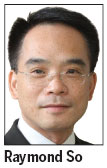Lack of political talent hurts HK
Updated: 2013-06-14 07:34
By Raymond So(HK Edition)
|
|||||||
Traditionally Hong Kong people are known as "economic animals", keen to develop the economy and concerned only with the creation of wealth. The fact is there were not many opportunities for the general public to participate in politics during British rule. The colonial administration was successful in turning people's attention to wealth creation.
But to say there were no voices for greater political involvement under British rule is far from true. The clever move was that higher education opportunities were limited. When the general public were not well educated, the call for political involvement would be low. Also, the colonial government adopted the approach of absorbing opposite voices into the administration. Very often, important opinion leaders were appointed by the governors as members of advisory committees. This in turn will make opposition voices less prominent.
The introduction of elections in the late 1980s was a drastic change in the local political environment. Elections call for greater political involvement from the general public. Unsurprisingly, people come to understand more about the election game. This development also calls for more political talents. Nevertheless, the standard of political involvement in Hong Kong is far from professional. Needless to say, people used to observe the low standard of debates on bills. From district councils to the Legislative Council (LegCo), members are more concerned with minor things than with having great vision as to how Hong Kong is to be developed or governed. Council members tend to look at minor accomplishments as if they have achieved a lot. One comical observation is that a district council member claimed that he successfully moved the government to extend the traffic light signals by 3 seconds. I just scratched my head, wondering what kind of politics was involved in that decision. Similar things also occur among lawmakers. In short, the standard of political debate is low in general and qualities of council members are far from perfect.

This observation somehow might be unfair to council members. They understand that the easy way to get votes is to advocate what they have done for the voters. Also, the government is an easy target to attack. As long as they can claim credit for minor things and accuse the government of doing nothing, they can be seen as able and responsible council members. This vicious cycle then makes the standard of political involvement even lower. This is the system in place and we can hardly change it.
This lack of professional development in political involvement will not be good for Hong Kong. Economically Hong Kong has developed into such a stage that greater professional representation in political involvement is needed. As such, there should be a great demand for political talents. The sad thing is that real talents are not interested in the recent system of political involvement. For capable people, they do not see being a politician as a lifelong career. Also, the lack of training and the small talent pool exacerbates the problem. Very often, the secretaries of policy bureaus do not have proper training in political involvement. They are professionals in their own fields before assuming their current positions. Their expertise is useful in policy formulation, but the trick is that nowadays secretaries also need to lobby various stakeholders for support. This kind of political involvement somehow is strange to the secretaries. When you ask someone with professional background but no political training to lobby groups who know little about the subject, the successful rate will be low.
The current problem of the government's decision-making is that those who make decisions do not have training in political involvement. The secretaries are now learning hard to become politically active. It takes time. The problem is the public cannot wait so long and they will cry out for immediate results. This system simply is not working.
If the government has a policy of recruiting some short-term talents into the government to take up tasks of different bureaus, these talents will gain experience of how government should be run. When their contract terms end, they can return to their original positions. This will help to develop a pool of talents for political involvement. The idea is similar to those of the so-called "revolving door" in Western societies. Of course, local adaptations are needed. But the key point is, without a constant of good political talent, it simply cannot meet the development of Hong Kong.
The author is dean of the School of Business at Hang Seng Management College.
(HK Edition 06/14/2013 page9)